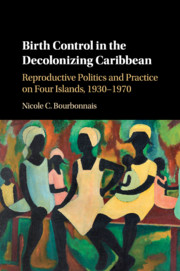 Birth Control in the Decolonizing Caribbean
Birth Control in the Decolonizing Caribbean Book contents
- Frontmatter
- Dedication
- Contents
- List of Figures, Maps, and Tables
- Acknowledgments
- List of Acronyms
- Introduction
- 1 The Answer, an Aid, a Right: Birth Control Debates and Social Movements in the Caribbean
- 2 From Politics to Practice: The Colonial Office, Foreign Activists, and Local Family Planning Clinics
- 3 Beyond Culture or Choice: Working-Class Families and Birth Control Clinics
- 4 A Matter of Cost: Reproductive Politics, State Family Planning Programs, and Foreign Aid in the Transition to Independent Rule
- Conclusion
- Bibliography
- Index
Introduction
Published online by Cambridge University Press: 06 January 2017
- Frontmatter
- Dedication
- Contents
- List of Figures, Maps, and Tables
- Acknowledgments
- List of Acronyms
- Introduction
- 1 The Answer, an Aid, a Right: Birth Control Debates and Social Movements in the Caribbean
- 2 From Politics to Practice: The Colonial Office, Foreign Activists, and Local Family Planning Clinics
- 3 Beyond Culture or Choice: Working-Class Families and Birth Control Clinics
- 4 A Matter of Cost: Reproductive Politics, State Family Planning Programs, and Foreign Aid in the Transition to Independent Rule
- Conclusion
- Bibliography
- Index
Summary
Rose Gordon wrote a letter.
She had read the Jamaica Birth Control League's (JBCL's) advertisement in the newspaper, she explained. She was 34 years old and had given birth fourteen times, with three lost pregnancies; she had – in her own words – been “a slave to childbearing for over fourteen years.” She made her intentions for writing clear: she wanted a “full stop” so that she could be “entirely free from this terrible strain.” Conveying a sense of urgency, she called on the league to give her letter its “earliest attention” and send her a response “as quick as possible.” She wanted information – she wanted support. She wanted birth control.
She was not alone. In fact, Rose's letter was one of hundreds written to the JBCL upon its creation in 1939. These letters came from across the island, from Port Morant to Lucea, some even from women living in migrant communities abroad. Collected and preserved by the honorary secretary of the JBCL, May Farquharson, the letters document a diversity of experiences and demands. Some of the women who wrote had multiple children and were feeling the physical, financial, and emotional strain of repeated pregnancies and innumerable mouths to feed; others were at the beginning stages of their reproductive lives but were looking ahead to their futures. Some wanted an end to childbearing, others wanted a temporary break; some wanted to stop a pregnancy that had already begun. Some were single mothers, others wrote with the support of their husbands or partners, still others wrote in secret. Indeed, the stories told by the letters often appear only loosely stitched together by a common struggle for control: over one's body, one's family, one's life.
This struggle was not particularly new, but the opening of the JBCL clinic certainly was, and it was not an isolated event. From the 1930s on, a growing group of activists across Britain's Caribbean colonies had begun to mobilize to demand that birth control spread – as one commentator put it – “out of the boudoir and into the banana walk,” in other words, beyond the private bedrooms of elites and into the urban slums, rural villages, and plantations where the islands’ working-class populations lived and worked.
- Type
- Chapter
- Information
- Birth Control in the Decolonizing CaribbeanReproductive Politics and Practice on Four Islands, 1930–1970, pp. 1 - 29Publisher: Cambridge University PressPrint publication year: 2016


